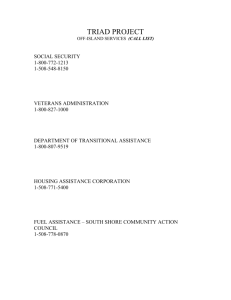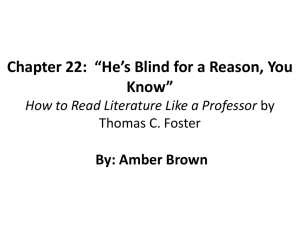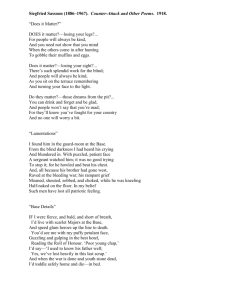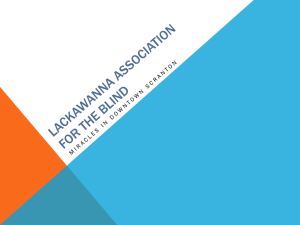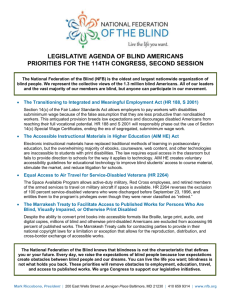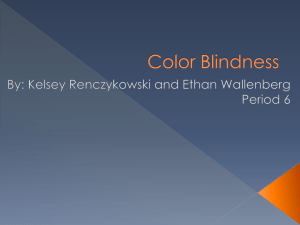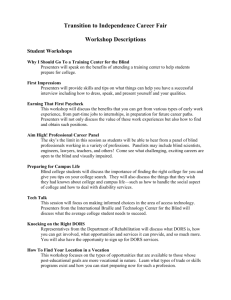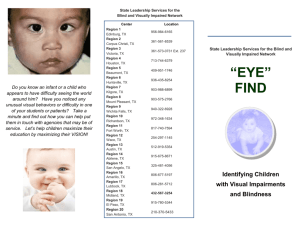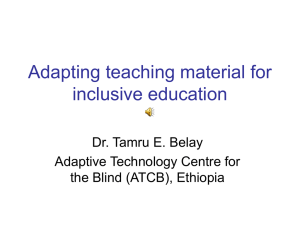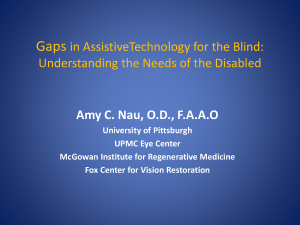the student slate - National Federation of the Blind
advertisement
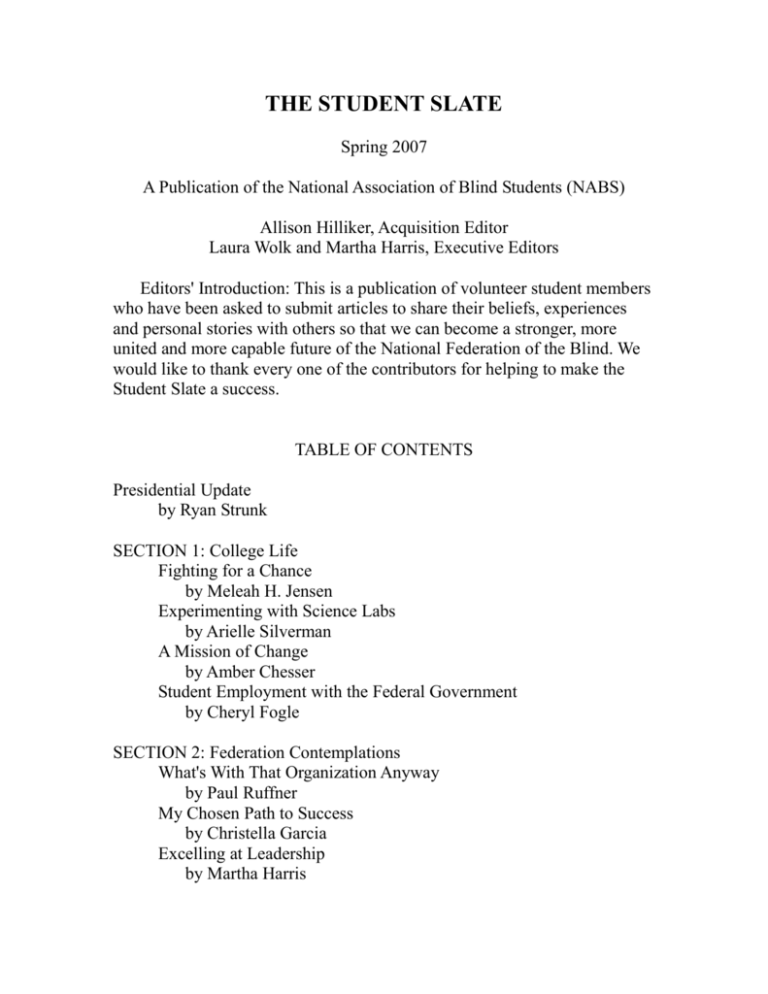
THE STUDENT SLATE Spring 2007 A Publication of the National Association of Blind Students (NABS) Allison Hilliker, Acquisition Editor Laura Wolk and Martha Harris, Executive Editors Editors' Introduction: This is a publication of volunteer student members who have been asked to submit articles to share their beliefs, experiences and personal stories with others so that we can become a stronger, more united and more capable future of the National Federation of the Blind. We would like to thank every one of the contributors for helping to make the Student Slate a success. TABLE OF CONTENTS Presidential Update by Ryan Strunk SECTION 1: College Life Fighting for a Chance by Meleah H. Jensen Experimenting with Science Labs by Arielle Silverman A Mission of Change by Amber Chesser Student Employment with the Federal Government by Cheryl Fogle SECTION 2: Federation Contemplations What's With That Organization Anyway by Paul Ruffner My Chosen Path to Success by Christella Garcia Excelling at Leadership by Martha Harris SECTION 3: Student Thoughts and Reflections The Positive Edge of Cynicism by Joe Orozco In the Corner of a Round Room: Hunting for Helen's History by Chancey Fleet From the Desk of the President Ryan Strunk Henry David Thoreau once wrote: “Success usually comes to those who are too busy to be looking for it." His statement certainly demonstrates why NABS has had such excellent advances in the past several months. There are few people in this world busier than the average student, yet even with class schedules, community involvement, campus activities, active social lives, and meaningful participation in our local chapters and state affiliates of the National Federation of the Blind, you all have found the time and dedication to make NABS grow exponentially. I cannot thank you enough for your hard work and your belief in this organization. In the following pages you will read about the lives and experiences of some of our young leaders in the National Federation of the Blind. You will learn about how they stand up to discrimination, how they participate in regular college activities, and how they spread the message and philosophy of the National Federation of the Blind. This issue of The Student Slate would not have been possible without the tireless efforts of a few extremely talented people, and it is only right that they be recognized for their efforts. First, I must offer my deepest thanks to Allison Hilliker, our second vice president, for her work in compiling the articles you will read in this issue. As I have written above, all of us as students are extremely busy, and finding students who can take time from their hectic schedules to write articles for this publication is a rare talent indeed. This Slate would certainly not have come into being without Allison’s help, and I offer my deepest appreciation and sincerest thanks for her work. In addition, credit is due to Allison and Joe Orozco for their initial editing of the Slate. I also wish to express my gratitude to the new editors of the Student Slate, Martha Harris and Laura Wolk, both leaders in our Pennsylvania Association of Blind Students and active members of the National Federation of the Blind. These two have spent considerable time editing and re-editing this publication, and I think our readers will be pleased with the result. Again I thank them for their hard work and look forward to great things from them in the future. It has been a tremendous year for the National Association of Blind Students. We have seen the successful revitalization of student divisions in Illinois, Colorado, and New Jersey and are pleased to welcome the New Hampshire Association of Blind Students as the newest member of our student family. I know that you will all join me in sharing the spirit of our movement with them and that you will bring them into your lives and hearts as members of our Federation. With the New Year upon us, we are ready to break new ground. We will tear down old barriers and build new bridges. We will devise new techniques and explore new frontiers. We will build our knowledge and increase our experiences—and in the end, we will continue to share our wisdom and philosophy and will do it all with the passionate spirit of the National Federation of the Blind. I thank you for everything you have done, and I thank you for everything you will do in the coming year. SECTION 1: College Life Editors' Introduction: The following four articles relate directly to the experiences of blind college students. They contain techniques for dealing with classes, provide information about participating in out-of-school activities and peek into the lives of a few students as they maneuver their college careers. Fighting for a Chance by Meleah H. Jensen Editors' Introduction: Meleah H. Jensen is a graduate student at Louisiana Tech University where she is working on a masters in Family and consumer sciences. She serves as a NABS board member and the president of the Louisiana Association of Blind Students. She also serves on the board of directors of the NFB of Louisiana. Below, Jensen shares the story of her journey towards obtaining equal campus employment. Albert Einstein once said, "A hundred times every day I remind myself that my inner and outer life depend on the labors of other men, living and dead, and that I must exert myself in order to give in the same measure as I have received and am still receiving." When I became involved in the NFB, I never realized how much I had to give. Even though I had already been given so much, I never contemplated I could continue to receive. I also never imagined that I could take on an institution as powerful as Louisiana State University. However, after applying to be a Resident Assistant and receiving the job, I found myself doing what I formally believed impossible. In the spring of 2003, I decided that I wanted to do something a little different to give back to the residents of LSU, which is what initially led me to apply for the RA position. After going through what seemed to be an endless application and interview process, the day finally came when I, along with about 100 others, was going to find out whether or not I had been selected. I found out I had received a position. Needless to say, I was ecstatic. For me, this was a major accomplishment for two reasons. First, to be selected, despite my blindness, was a big deal. Since I had never known another blind RA, it was nice to consider myself a trail blazer. Additionally, although this was a big accomplishment, I saw the fact that I had been one of twenty applicants chosen as even bigger. I immediately began thinking of alternative techniques that I could use to do the job and decided to set up a meeting with the director of the hall to which I had been assigned. I knew that she would have questions. The meeting with my boss could not have gone better. She seemed really excited to have me on staff. The semester came to an end, and I was feeling pretty comfortable. I felt like I had made it through the worst of the challenges and assumed that my job was safe. Unfortunately, I was wrong; this was only the beginning of the story. In mid-June, I received a phone call from my boss. She asked me if I would mind if she gave someone from Human Resources my phone number because they had some questions for me. I saw no harm in her passing my number along; I figured that the conversation would be one similar to the one which I had had with her. I would answer some questions and that would be the end of it. When I finally heard from the lady from HR, she informed me that they wanted my physician to fill out a form about me. As soon as she said this, my first thought was "No, absolutely not." I pulled myself together and politely told her that no doctor would be able to state my capabilities. I tried to make her see my point of view, but I was unfortunately unsuccessful. She was very adamant about the forms needing to be filled out by a doctor. I knew this was wrong. I could almost guarantee that they were not making any of the other new staff members go through this. I knew exactly what I should do. I called several of my Federation friends to get their opinions on the situation and what they thought I should do. I got basically the same answer: LSU should be asking me about my abilities, instead of listening to some doctor who, most likely, knew nothing about me and my capabilities as a blind person. The only thing I was afraid of was losing my job, but I knew I had to stand my ground. If I let them get away with this, what else would they try? The rest of the summer progressed without further incident until I again spoke to the lady from HR and was informed that I would be receiving a new job description. My radar was up again. I had the feeling that they were purposely writing a new job description, and these suspicions were all but confirmed when I read it. It was completely skewed to make it look as if all aspects of the job were visual, and it made it appear as if I would be unable to complete the required tasks successfully. I was extremely upset about the new job description. I could not believe that they thought so little of the capabilities of blind people. At this point, I knew I had to do something. Fortunately, I knew exactly who to call for advice. I received the job description on a Saturday and by Monday morning had phoned Peggy Elliott. She told me that she thought it was time for me to find myself a good attorney. She was going to call Dr. Maurer to get his opinion and then get back to me. I waited eagerly for her to call me back. When she did, I was told that Dr. Maurer agreed with her. I was a little overwhelmed because I simply couldn't believe that this was happening to me. Though I had sat through numerous NFB Presidential reports, I never believed that anything like this could ever happen to me. The summer ended; I still refused to do the paper work, even though the deadline was quickly approaching. Meanwhile, the attorney search continued. We kept running into snags, mainly because almost all of the attorneys that we found were already on retainer by LSU. The day before I was supposed to move in to begin training for my job, I received a phone call from one of the associate directors of Residential Life. He informed me that we, along with some other university officials, were to have two meetings to discuss how I would do the job. I was relieved. I thought that LSU was actually going to do the right thing. Unfortunately, it wasn't that simple. When I arrived, I could already sense the tension. I felt like a lamb being led to slaughter. We talked for about three hours, going over every aspect of the job description. At the conclusion of the meeting, I was told that they would be in touch, and the only thing I could do was wait. I was very shaken after that whole ordeal. I was feeling a mix of emotions including hurt, anger and just plain fear Despite the way I was feeling, I managed to pull myself together for the afternoon meeting. It went surprisingly well, since no one seemed at all worried about how I would do the job. If I were going to have to prove myself, it would be because I was new, not because I was blind. I left that meeting feeling much better, and I looked forward to starting first thing the next morning. However, when I went to sleep that night, I was unaware that my life would be drastically changed in a matter of hours. I awoke the next morning and headed out with confidence. It was hard to believe that the first day of training was finally here. I made it about half way across campus when my cell phone rang. I considered not answering it, but I thought it might be one of my friends calling to give me some last minute words of encouragement. To my dismay, the voice on the other end of the phone was not a friend but one of the people from RL who I had met the previous day. He asked me if I could stop by his office on my way to training. I knew what was about to happen, but I did not want to believe it. Upon reaching his office, my suspicions were immediately confirmed. They were reassigning me to an office position! I went numb. I had been falsely hired; I had signed a contract and felt betrayed that they could do this. As I listened to him trying to soften the blow by rattling on about how great my new position would be, my shock turned to hurt. I just sat there biting my lip to keep from crying. The one thing I had been dreading since this whole ordeal started had actually happened. Action had to be taken. I immediately got on the phone with Pam Allen, my NFB State President, and spilled out what had happened -- all the while trying to hold it together. I was told that we were still looking for an attorney, but with my current situation, the search was stepped up. That same day we were able to find one in New Orleans who seemed as if he'd be able to help. I spoke to him later that day, and we set up a meeting for the following week. The only thing that he told me, which I didn't really like, was that I would have to take the office job in order to pursue legal action. I thought, "Are you serious? You want me to work for those people who have just ripped my world apart?" I felt better after talking to him, but only slightly. I met with my attorney and discussed the details of my case. He explained some of my options, but he told me the first thing I would have to do is file a complaint with the Equal Employment Opportunity Commission (EEOC). When I spoke with the EEOC, they felt LSU had done nothing wrong. But LSU changed the job description and broke a contract. How had they not done anything wrong? I was told that LSU would be sent a copy of the complaint, so now I had to wait for them to receive it and respond to it. Since the EEOC had found no wrong-doing, I was released with a "right to sue" letter. One week after filing the complaint, I received a call from my boss saying that the compensation for my new job had been changed to match what I would have gotten as an RA. Obviously, they had received my paperwork from the EEOC. I was unsure whether to take the change in compensation. It seemed as if they were trying to buy me off. They thought I would go away and leave them alone. I called my attorney, and he said that I had to take it. He also told me that there was nothing else he could do for me since LSU had changed the compensation. I thought it was very unfair that LSU could get off so easily. I remained with RL for another month and never saw my "change in compensation." My attorney had told me previously that I could leave the department of RL, provided that I could find another position. By October, I had had enough of the department. Fortunately, I was able to return to the position that I held the previous year in the office of Student Services in the College of Education. I was looking forward to returning to a place where I was not only needed, but more importantly, wanted. My legal battle with LSU was put on hold but only temporarily. One afternoon in early October, I spoke with Angela Wolf, the NFB-NABS President. After listening to my story, she said something which put the wheels in motion again. She asked me if I still wanted to fight. I told her that I did, but I no longer knew what to do. She suggested I call Dr. Maurer, so that's exactly what I did. The first thing he said was to call my attorney and dismiss him. After I did this, Dr. Maurer told me he would be contacting Scott LaBarre, an attorney with the NFB, to discuss my situation. After I spoke with Dr. Maurer, I couldn't imagine why I had not done all of this sooner. A few days later, Scott contacted me, and my legal battle was once again moving forward. As of the end of November, we filed suit in federal court in Baton Rouge. It took LSU a long time to respond, and it was not until mid-March that both sides finally sat down to see if we could reach an agreement. To me, the meeting went well. However, it took time to hear back from LSU's attorney, and when we finally did, the news was not good. They offered me a position, not as an RA, but an Academic Peer Mentor (APM). As nice as the offer was, I had no interest in it. Though it would have been a great opportunity, it just was not the position for which I had been hired. I spoke to Scott and expressed my feelings about the offer. He explained a few options: We could still try to settle without a job being part of it or take the case to trial. I was very torn; part of me wanted to settle and put this behind me, but there was also a part of me who still wanted to fight for the position. I wanted to prove to LSU, (and to myself), that I was more than capable of doing it. Once again, I sought the opinions of several Federation friends. Each of them raised very good points and gave me much to ponder. In the end, because of personal reasons not related to blindness, I decided to settle the case in the summer of 2004 without a job. Even though some people may have disagreed with the decision, I felt that I truly did what was best for me. Regardless of how things ended, I know one thing is certain: I never would have made it without the support of my Federation family. Unfortunately, discrimination still exists, but, because of the NFB, we are made stronger. The support and the beliefs of thousands of people can help us make it through the hard times. We are more successful because of the actions of those who have gone before us, those who have received and from those who have given back. It's what we can give and take from one another that makes us such a powerful force in changing what it means to be blind. Experimenting with Science Labs by Arielle Silverman Editors' Introduction: It is no mystery that our country spends a large amount of money to enhance interest and study in the areas of math and science. The average student might be persuaded to enter these fields. However, for a blind student, such interests might be inhibited by the misconception that blind people can't play an active role in a science lab. Arielle Silverman is a senior at Arizona State University, majoring in Biology and Psychology. She plans to pursue graduate work in social psychology. She is the president of AABS, as well as a member of the state aphiliates board. In this article, she proves the hypothesis that blind students really can dedicate their talents to whatever field they choose. One October afternoon about two years ago, my biology lab received a rather interesting assignment. We were divided into groups of four and given an aquarium containing ten crickets. We were to observe the crickets for ten minutes; then, we were to design and carry out an experiment testing some notable aspect of the crickets' behavior. The crickets made little noise besides their characteristic chirping, so most of our observations were visual. Though I could not see the crickets, I was working with three energetic girls who provided a detailed explanation of the crickets' every move. Before long, all four of us noted a pattern: The females eagerly jumped on top of both each other and the males, but the males did not seek physical contact with others. Therefore, we decided to vary the ratio of males to females and observe how frequently the crickets jumped on top of one another. I did not physically manipulate the crickets, but I was involved in the design of the experiment, and I recorded the data in my Braille Note. Sure enough, as we added female crickets to the mix, the number of "touching events" between the crickets increased. This finding by itself might not be very exciting, but it was a good example of the scientific method, which is what college science labs are really about. As a biology major, I have now completed two biology and two chemistry labs. Before starting college, I worried about how I, as a totally blind student, could participate actively in the labs. After all, I cannot read chemical bottles or measuring instruments, nor can I look at cells under a microscope. However, I discovered that lab work is not about sight but about understanding and applying the science. By using what I learned in the lecture portions of my biology and chemistry classes, I found that I could participate in the labs along with my sighted classmates. Most of the labs were done in groups, so my main strategy was to understand the material at least as well as my lab partners. By doing this, I could both help and lead my group in planning our experiments and interpreting our data. In addition, I was always expected to pull my weight in writing the lab reports, even sections that were graphical in nature. A few of our lab assignments were individual. For these, I chose to work with a science graduate student that my university hired as a lab assistant. For example, the assistant helped me when I needed to know how a chemical solution looked or when I had to present my data on a poster. Some assignments, though, were fully accessible without the assistant. In one project, I grew corn plants in my dorm room and tested whether praying would affect the height of the plants. I measured the main leaf of each corn plant using a Braille ruler and compared the lengths of the prayed-for and not-prayed-for plants. It was fun to gather my own data without any sighted assistance. While I enjoyed working with the hired lab assistant, I think that I could have done just as well on my own or if I had hired my own reader. Looking back, I would say that my lab courses were challenging, not because of my blindness, but because labs are meant to stretch one's thinking skills. The labs have taught me much about biology and chemistry. More importantly, though, they have showed me that a blind student can participate actively in any course. The most important technique for any student, blind or sighted, is to study hard and be familiar with the course material. Once that is achieved, the rest is just a matter of creativity and, sometimes, teamwork. A Mission of Change by Amber Chesser Editors' Introduction: Amber Chesser is a student at Louisiana Tech University, majoring in English and Psychology. She is the secretary of her local NFB chapter and in her spare time enjoys reading, writing and traveling. One of her travels took her to Western Canada, and in this story, Chesser shows us how blind students can put blindness skills and a positive philosophy into practice. Last November, a week before Thanksgiving, I had the privilege of traveling with 73 students and adults from the BCM (Baptist Collegiate Ministry) at Louisiana Tech to western Canada. Once here, we divided into teams and traveled to six different locations in Alberta, Canada to work with missionaries in their churches and other fields of service. My group, the largest with 18 students, traveled to Calgary, where we joined a husband and wife missionary team who were both graduates of Louisiana Tech. Although I had many memorable experiences during our week there, one of the things that will always stay in my mind is the way I changed a few opinions about blindness. The air was thick with tension as my teammates and I made our way through the Dallas airport. Even though I knew four or five people on the team, most people seemed uncomfortable and uncertain about talking to me. They seemed afraid to ask questions or were unsure of how much to help me. I was polite and answered their questions, but I hoped that our whole trip would not be so tense. I tried to act as normal and calm as possible, hoping to help them feel comfortable with my blindness and me. In Calgary, we spent a good bit of our time driving. I found that this time in the van was very helpful in relieving a lot of the tension. We had great conversations and got to know one another. My teammates asked me questions about blindness, which I answered willingly. I also used their questions as a way to ask them questions about themselves so that our conversations did not pertain solely to blindness. By the second day, everyone was a lot more comfortable around me, even making blindness jokes and laughing at mine. That was a true sign of their comfort, and it made me so happy. I wish there was one definite way to ease people's minds about blindness, and I wish it worked for everyone. Unfortunately, we have a mission in life; that mission is to find our own unique ways to change opinions about blindness. I chose to use humor and to seek equality in all aspects of this trip. My teammates saw me in lots of situations: learning to make snowballs, using a Braille menu at a local pizza place to place an order, eating at a local church potluck dinner, surveying locals about their involvement in church and enjoying the scenery at Lake Louise. At times during these various events, I had to say, "Hey, show me how to do that," or "could you describe the different areas we are in?" By participating and showing people that I appreciated equality, I accomplished my mission. As students, we have many awesome opportunities that most people do not have. I encourage everyone to take advantage of as many of them as possible and tell them to accomplish the mission of the Federation: security, equality and opportunity. It takes effort, but it can be done, one person at a time. Student Employment with the Federal Government by Cheryl Fogle Editors' Introduction: Cheryl Fogle is a former president of the New Mexico Association of Blind Students, as well as a graduate of the Colorado Center for the Blind. Currently, she is a doctoral candidate at the University of New Mexico in Anthropology. She works for the Army Corps of Engineers, and below she describes how she arrived at this position, as well as provides helpful resources for students seeking employment. During the summer of 2005, I received a unique opportunity to work for the Federal Government through the Work Force Recruitment Program (WRP) for college students with disabilities. Because of this, I now work for the U.S. Army Corps of Engineers, Albuquerque District, where I assist archaeologists with various tasks. My duties include writing correspondence and reports, reviewing the results of archaeological excavations required for projects or permits, contacting museums where the Corps stores artifacts and writing documents that instruct Corps staff how to protect the archaeological sites under their jurisdiction. My work has given me an insider's view of government regulations designed to preserve archaeological sites--a perspective missing from my academic studies. WRP is designed to be a temporary employment program to help students gain job experience. Appointments last for fourteen weeks, which is an ideal length for summer internships. Once a student has started work and proved his or her capabilities, other employment opportunities can be arranged. For instance, This fall my supervisor arranged funding to extend my employment with the Corps for the next academic year. Therefore, my current position is not part of a disabilities program. WRP offers internships in a variety of geographic locations. Half of the positions are located in the Washington, D.C. area working for the two sponsoring agencies--the Department of Defense and the Department of Labor. WRP staff provides information about temporary housing in various university dorms, but the student must make his or her own living arrangements and pay for housing while in D.C. The remaining positions are located in various agencies throughout the United States. In January and February of each year, WRP interviewers visit college campuses nationwide. Students interested in this program should check with their school's career services or disabled students office to see when a recruiter will be visiting their campus. The WRP makes a database containing students' majors and skills available to federal agencies and any private sector employers who request copies. Once the database is released, all job offers and accommodations are arranged between the applicant and the employer. More information about WRP is available online at www.opm.gov/disability. Federal employees are eligible for the Computer/Electronic Accommodations Program (CAP), which supplies screen readers, scanning software and electronic notetakers. A recruiter or supervisor can make an accommodations request to CAP which will order and pay for the equipment. More information about CAP is available at www.tricare.osd.mil/cap. The Federal government has many opportunities for student employment. These programs seek students from diverse backgrounds, so students involved in the NFB may find other opportunities not restricted to being a disabled student. Examples include Women in Public Policy Internships, Washington Internships for Native Students and the Hispanic Association of Colleges and Universities' National Internship Program. Internship listings and their pay rates are available online at www.usajobs.gov and www.studentjobs.gov. Full-time, permanent positions are also listed on the usajobs website. All websites listed in this article are easy to navigate using a screen reader such as JAWS or Window Eyes. SECTION 2: Federation Contemplations Editors' Introduction: The following three articles are written by students who describe the influence the NFB has had on their school experiences, as well as their overall lives. What's With That Organization Anyway? by Paul Ruffner Editors' Introduction: Paul Ruffner is a sophomore at American University in Washington D.C. While he is undecided about a major, his interests lie in the area of international relations. Ruffner attended his first NFB convention two summers ago as a national scholarship winner. Here he describes that convention and the way it changed his perspectives on both the Organization and on blindness. As I recall, I was in junior high school when I first heard of the NFB. The organization was described to me as "a bunch of card-carrying nuts," and I was advised not to join. I, therefore, put them out of my mind, thinking that learning how to multiply matrices was far more important. The next time I took any notice of the NFB, I was in my senior year of high school. By that time, I was frantically applying for colleges, weighing financial aid offers and looking for scholarships. I heard the NFB was offering scholarships and awarding each winner a trip to the National Convention. I decided to apply for one, but only after I researched what exactly the NFB does. Far from "a bunch of card-carrying nuts," I learned what sets the NFB apart from other organizations. I was inspired by the organization's philosophy of blindness and the NFB's goal of achieving equality for blind people in society. One of the best things about convention was all the people I got to meet while there. Both of my roommates, Hobie Wedler and Steve Decker, were talkative and funny guys. We talked politics, joked around a lot and had a riot of a time. It was exciting to learn all I could about their life experiences; I was also inspired by the way they viewed blindness--as a physical characteristic, not a handicap. More than anyone else, Hobie and Steve convinced me to think of blindness in the same way as the Federation. A good example of what I'm driving at came on the third day of the convention. Each day, scholarship winners were mentored by a member of the Scholarship Committee, who taught the winner about his or her experiences as a blind person. My mentor asked me if I felt confident walking to a restaurant several blocks away. Until then, I had always been fairly confident in my travel skills, but I wasn't so sure I could make it in an unfamiliar city without first learning a route. Then, I asked myself what Hobie or Steve would do in the same situation. They both seemed like independent people who could do something like that without a problem. Why not put myself to the test? On the last day of the convention, I decided to test my travel skills. Sure enough, I made it without a hitch. If it weren't for Hobie and Steve, I don't know if I would have trusted myself to try that adventure. The best moments of the convention were the meetings of the National Association of Blind Students and President Maurer's incredible banquet speech. The NABS meeting taught me that I was far from alone, as I fretted over getting books on time for classes. Additionally, it gave me the confidence that comes with belonging to a larger community of blind students. The highpoint of the convention, however, was President Maurer's unforgettable banquet speech. I'd heard from attendees of previous conventions that the banquet speeches were both hysterically funny and very inspirational. However, I wasn't at all prepared for what happened next. At one point, I was in tears of laughter as President Maurer described the sheer idiocy of the measures taken to "protect" blind people, who are supposed to be incapable of doing much of anything without dire physical injury. I was also inspired as he spoke of the NFB's mission to eradicate such perceptions and for the blind people of the world to take their place as equals in society. In short, the convention was truly a life-altering experience. The things I learned, the people I met and the resulting confidence I gained in myself have brought about fundamental changes in me. Probably the biggest of such changes was my increased confidence around computers. Before convention, I was paranoid that something would go wrong with any piece of technology I touched and that my blindness might prevent me from figuring out what the problem was, let alone solving it. When a computer program wasn't easy to use, for instance, I would get angry and not bother to find a solution for the problem. Attending convention made me realize the unhelpful nature of that kind of thought. Now, I don't get as upset when I have a problem; I do my best to solve it. In fact, the only drawback to a convention is that it has to end at some point. I can't wait to go again, hopefully next year, to learn more about myself, others and what each NFB member can do to improve the society in which we live. I consider joining the NFB one of the best and most useful decisions I have ever made. For instance, I find it ironic that I have never had any practical use for multiplying matrices. On the other hand, I've found many numerous advantages to being one of the afore-mentioned "cardcarrying nuts" who make the NFB a truly unique organization. My Chosen Path to Success by Christella Garcia Editors' Introduction: Christella Garcia is working toward a Bachellors degree in Psychology at Chicago State University, with intentions of going on to graduate school at Louisiana Tech University. In this article, she discusses her academic achievements which have been compounded by practical experience working for the Society for the Blind in California. Christella is a board member of NABS, as well as vice president of the newly formed Sports and Recreation Division. In this article, Garcia's philosophy of blindness is revealed through a glimpse of the events that helped shape the student we see today. I believe that all of us have a particular path in life that we are destined to walk along, but it is up to us to decide how we will go about traveling it. I was fortunate to grow up in a surrealistically beautiful land of enchantment, also known as New Mexico. I was the youngest child in a family of six, and I had a wonderful childhood full of laughter, love and plenty of mischief. My parents treated me the same as the rest of the family. They never coddled me. In fact, they probably pushed me harder. I never knew that, when they found out I was blind, they were heartbroken. They were concerned about the life I would lead as a blind person, yet they always taught me to reach for the stars. Fortunately, they learned about the National Federation of the Blind, where they met successful blind people who taught my parents that if I learned a few necessary skills, I could lead a full, independent life. Becoming part of the Federation family was a life-changing event that helped my parents to assist me with anything I wished to attempt. School was okay, but sports became my passion. I was involved in judo, track, goal ball and cheerleading. I loved the freedom, independence and confidence that I felt when I participated in these sports. On the other hand, it was not always smooth sailing for me. When I was a teenager, I struggled with my blindness as most people do. I was jealous of all my friends when they were going to Driver's Ed classes while I was stuck learning to use a cane. I hated being blind, and I felt as if the cane were a big neon sign announcing, "Christella is Blind! Look out!" Oh yes, I was bitter and definitely felt sorry for myself. Fortunately, I always had encouraging role models who taught me about positive blindness philosophy--even when I didn't want to hear it. I was stubborn, but image was important to me. It took several bumps on my hard head to get over myself and finally accept my blindness. It took a long time for me to get comfortable with using a cane; now it is my best friend, and I view it as a symbol of independence. Even if I break a few canes or have to replace the tips, it is still a lot cheaper than the maintenance on a car. That leaves me with money to pursue one of my favorite hobbies--shopping. Sadly, when I was about 24, my father passed away. Rather than digging a hole and crawling inside it, I decided to take a big leap and move to Sacramento, California. I wanted to embrace a new challenge, and I felt ready to leave my family, my friends and everything that was familiar to me. It was just the adventure I needed to undertake. I think that was the best decision I have ever made. It was hard to let go and step away from my comfort zone, but I needed a chance to challenge myself to be as independent as possible. I miss my family, but I also know that they respect my decision. I know that my parents did everything they possibly could for me, but the gift that I am most grateful for is the tough love and that can-do attitude they instilled in me. Now I am working for an agency called the Society for the Blind, teaching both youth and seniors daily living skills. I also coach a local goal ball team that I started myself. I love building an upbeat community. I am in school, too, working towards attaining my degree in Educational Psychology from Louisiana Tech University. I know that my journey in life is just beginning, and I optimistically embrace all the obstacles that I will undertake. I look forward to the day when I am a cane travel instructor and meet a young person who is just as stubborn as I used to be. What a challenge that will be! Excelling at Leadership by Martha Harris Editors' Introduction: Martha Harris is a Freshman at Bloomsburg University where she is majoring in journalism. She also serves as President of PABS. Below is what Harris has to say about the responsibilities of being a Federation member. Power is an ideal with many different definitions. Some people see power as being able to control and corrupt society, while others see it as a chance to improve a society, an area or an organization. Rights and responsibilities accompany this positive power. As young people in the National Federation of the Blind, we have the right to speak and to organize, but with this right comes the responsibility of learning from our previous leaders, educating others, advocating for ourselves and developing new ideas for the future. The first step is learning from our current and past leaders and role models, people who have experienced what we are experiencing right now. People should listen to the division, chapter and national presidents when they speak; read the publications published by our organization, and become involved. Ask questions of your fellow students who are older or more experienced than you. Being a good leader does not mean you know all the answers; it means you can help others to do what they want to do with your information. I have joined the student organization, and I have learned so much from my fellow students. Any time I want, I can post a question to the NABS list, and usually someone can give me an answer or direct me to someone who knows. Either we know a subject ourselves or we know where we can find information on it. Taking the time to learn from previous successful leaders will pay off in personal growth as a leader. Having resources and being observant is an important part of this position. However, the next step after being an observer is being a leader. To be a good leader is to be open-minded, active and experimental. All of these factors help when educating others. We must realize that, although it would be nice, most sighted people do not know or have not learned about blind people. They have many misconceptions about who we are, what we can do and how we live. Being active means going out to talk to people. I have found this to be one of the best methods of education. An important group to talk to is younger students--sixth grade and below. They are the most curious and the most unafraid to say what they are thinking. They will ask you honest, direct questions. All people learn prejudices or biases, whether good or bad, when they are young. If we can talk to them and show them we are like everyone else, we can have a more educated, tolerant and accepting group of people in the future. Along with the sighted public, we also have to educate newly blinded people and those who have been blind for a long time. People who are newly blind might feel scared and hopeless because they do not know a blind person. If they have seen one, it was probably a badly portrayed one on television or in a movie. These people need to be exposed to the alternative techniques that we use. When they receive blindness training, they will gain freedom to travel independently. They will become enthusiastic about learning from and taking advantage of every new opportunity. We can teach them about the computers, technology and note takers that we use to work with our colleagues, and they can learn reading, writing and arithmetic--all of the activities we are able to do because of Braille. Teaching them all of these skills will lead to change for blind people. Confucius wrote "Change has a considerable impact on the human mind. To the fearful, it is threatening because it means things may get worse. To the hopeful, it is encouraging because things may get better. To the confident, it is inspiring because the challenge exists to make things better." Having a positive attitude and being hopeful are all important characteristics. If we are hopeful and confident, we can accomplish anything we want to as an organization. In addition to education, a young leader of the NFB needs to be able to advocate for himself or herself as well as others inside and outside of our community. Advocating for oneself could range from politely telling someone help is not needed to cross the street, to standing up for oneself when it comes to reasonable accommodations in the classroom or in extracurricular activities. After one learns to advocate for oneself, one can advocate for others. For example, a student could have a problem with a teacher or professor because he or she thinks the student is incapable of taking the course. As an experienced student, one could talk to the professor or teacher to explain that other blind students have successfully done this before. One could demonstrate alternative techniques that a blind person uses to complete the course. Another way to advocate is to support legislation relating to blind people or people with disabilities. Many groups lobby for laws to be passed, and we need to be one of them. We can go to our state legislators to advocate for a Braille bill to be passed. Braille is so important for blind people to use; yet, in most states, it is not mandatory for blind children to learn this vital, necessary skill. We can go to Washington, D.C. to fight to receive money that is needed to go to college. Many blind people are unaware of what skills, benefits and services are available. If young leaders and students in the National Federation of the Blind don't help to pass legislation, many people will suffer because we didn't take the time to stand up for our beliefs. Finally, we need to develop goals for the future. We can teach others about the technology we use as part of our daily lives. We can help software companies, web designers ETC. make equipment accessible to the ones who use it all of the time. We can help others learn about the several priceless advantages of learning Braille. We can show people that we can travel independently on public transportation. Whether we are setting goals so that more people learn Braille, teaching others to travel independently or developing and using technology, we can make a difference in the lives of people now and for many years to come. As young people in the National Federation of the Blind, we have much influence and power over the events that will shape our future. We need to be determined to make the right things happen instead of waiting to see what will happen. Leadership is action, not position. According to James Fisher, "Leadership is the special quality that enables someone to stand up and pull people over the horizon." If we allow ourselves to learn from our laudable leaders, enthusiastically and energetically educate others, adequately and accurately advocate for ourselves and deftly and determinedly develop new ideas, we will be successful in crossing the horizons and hurtles in our lives and changing what it means to succeed as a young leader in the National Federation of the Blind. SECTION 3: Student Thoughts and Reflections Editors' Note: The following two articles express the observations and opinions of two NABS members on general blindness-related topics. The Positive Edge of Cynicism by Joe Orozco Editors' Introduction: How many times have we found ourselves wishing Congress would pass a law to make things better? The truth is that too many of our discomforts are blamed on laws which have not been passed or that are not properly enforced. In this article, Joe Orozco walks us through the responsibilities laid upon our representatives and the obligations we have to confront ourselves. He recently graduated from Texas State University with a degree in public administration. He is currently devoting a year of service to AmeriCorps in Washington, D.C. Joe is a NABS board member and served as president of TABS from 2004-2006. A politician died the other day. Upon arriving at the pearly gates, Peter informed him that he was in a good mood and would allow the politician to examine both Heaven and Hell and choose which place he would rather spend all eternity. The politician descended to Hell and was greeted by the most festive of occasions: great music, exquisite food and excellent wine. The politician wondered how anyone could refuse such a blissful atmosphere, but, to be fair, he rose to Heaven and found a pleasant calm the likes of which he had never experienced. Yet the dreamy state of euphoria was not enough to satisfy the man's desires. He chose Hell and returned to discover a depressing wasteland. Shocked, the politician looked about the frigid desert and demanded to know what had become of his paradise. Swaggering up to meet him, the Devil tipped his hat and grinned as he coolly explained: "Yesterday we campaigned. Today, you voted." This past February marked my fourth year with the Federation. I joined in October of 2001, but it would take Washington Seminar to show me what the movement was really all about. The experience provided a panoramic view of the organization's positions and the individuals responsible for its overall success. I was impressed and have remained an active member ever since, yet at the time my prime reason for attending the seminar was a keen interest in politics and a desire to visit the offices where so many of our policies are negotiated. Several visits to the Hill and many phone calls later, I began to conceptualize more fully the depth of our government's bureaucracy. While my introductory humor may reek of cynicism, I would opine that the gentle slam on politics might do well to teach us a hard lesson about the reality surrounding our own environment. While creative innovation has opened doors to opportunities once thought impossible, it has also inspired bouts of agitation when things do not go as one would wish. Each year technology expands in an attempt to level the playing field for blind consumers. With a few keystrokes, it is now possible to determine one's global location. Sitting in a lecture hall, one can now take notes on a portable device whose functionality is mostly equal to that of the machine producing the PowerPoints. Electronic texts have flooded the Internet, and the hand-held reader can now reveal the ingredients of a can of soup. With so much progress, it only makes sense to assume that general public attitudes have kept up with the times, and when we encounter the occasional exception, there is typically a law to which one can point to show the utter abuse of justice. Legislation, like technology, has the advantage of facilitating equality, but it all too often runs the risk of creating unhealthy dependency. One of the most misunderstood laws is the very same law to which many alleged victims turn when they feel their rights have been violated. The Americans with Disabilities Act is justifiably celebrated as the law that delivered the disabled community from discrimination in public establishments; however, the protection under the law is perceived to be so encompassing that at times, the size of the violation does not matter as long as the ADA is there to rely upon. Some of the more popular myths include: requiring restaurants to provide Braille menus, expecting businesses to spend superfluous amounts to make facilities accessible, providing for the right to always be accompanied by a dog guide and granting distinguished consideration to disabled job applicants. Servers are more than capable of reading a restaurant's selections. Only reasonable accommodations are expected of a public venue. Filthy dogs or dogs which are otherwise misbehaving do not have to be welcomed into a public building, and a blind applicant must meet the general requirements of a position like everyone else. Nonetheless, it is not uncommon to hear of cases where success is believed to be staunched on account of a law not being followed, so to what extent should we place our faith in legislation? Laws are passed to correct a wrong but cannot be expected to change mentalities. Racism cannot be expected to vanish as a result of the Civil Rights Act. Conversely, legislation like the Americans with Disabilities Act, the Fair Housing Act, the Individuals with Disabilities Education Act and the Help America Vote Act cannot be expected to protect us completely against the obstacles that are likely to punctuate our experiences. For every effort made to facilitate accommodations in college campuses, there will always be a stubborn disability services coordinator who thinks he or she knows more than the disabled student who is supposed to receive assistance. Education in general will always involve faculty, administrators and specialists who operate in accordance with the curriculum in which they were trained to believe. Discrimination in the workplace is illegal and will no doubt occur more often than we would like, and unfortunately, rolling out the legal carpet may only succeed at further degrading the employee's future with the company as well as the prospects for later applicants. Meanwhile, the government cannot be expected to bend at our every whim. One need only look to the results of the Instructional Materials Accessibility Act, one which would have required publishers to send educational material to a central repository to be reproduced in an accessible format. We wanted publisher compliance to be mandatory. However, in the reauthorization of IDEA, compliance was left voluntary. Similarly, in its recent Lockhart decision, the Supreme Court ruled that repayment of student loans outstanding by more than ten years could be deducted from social security benefits. Regardless of how the decision is viewed, the proof remains that laws are as likely to protect blind individuals as they are of holding them up to certain responsibilities. Grim though the lesson may appear, it serves to remind us of a few basic principles. First, putting the political process into perspective may serve to reinforce the need for education. By this, I mean the need for us to educate others. Chances are that outside of the people we strive to educate every February in Washington, the average American will not be aware of the laws and regulations that protect the equality of the blind. Giving way to hasty accusations and explosive tantrums when laws are broken will not help the situation and will most certainly not change the offender's initial understanding. Whatever else may hold true, we are the minority and must work harder to give a positive representation. Second, it is safe to assume that no amount of education will improve the opinions of certain parties; there is no reason why any student should permit the breadth of personal achievements to be dictated by isolated pessimism. Success should never be entrusted to a single factor anyway, and we should never gamble our aspirations on opinions that are not entirely our own. Next, there was a time when no laws existed to ensure the success of blind students making their way through high school, and the idea of college was laughable. Not so far back in history students wrote with a slate and stylus, or they did not write at all. If they could not so much as write, how could they argue for better employment opportunities? Despite these challenges, Dr. tenBroek beat the odds, learned and taught at prestigious universities and went on to set the groundwork for the organization we see today. Hence, we are left to surmise that while our efforts in D.C. may one day yield legislation as beneficial as the type already established, far too many advances have been made outside of Congress to lull us into feeling as though our individual progress is somehow inhibited by negligence of existing laws or lack of laws yet to be written. In short, politics sometimes deserves the shudder with which it is often met. Congress moves very slowly. We may need to fight long and hard for our representatives to acknowledge our concerns. In the meantime, we should learn to be self-sufficient, to pick our battles strategically, to maximize our available technology and remember the fundamental methods that set the basis for the inventions we currently use. No one could properly argue that faith in our government is a wasted prayer, but no major player in history ever paused to consider how a lack of legislative protection could stop him or her from making an impact on future generations. In the Corner of a Round Room: Hunting for Helen's History by Chancey Fleet Editors' Introduction: Chancey Fleet graduated from The College of William and Mary in 2005, where she obtained a degree in Psychology. She currently does freelance work in the field of assistive technology. Chancey is also the former president of the Virginia Association of Blind Students. Below, Chancey sheds a new light on a familiar historical figure and describes the relevance this woman has on the lives of blind youth today. Sometimes, sitting in an audience is harder than being part of the show. This thought came to me in 1998 as the curtain came up on a high school production of The Miracle Worker. I clasped my hands tightly together, letting my fingernails bite into my skin to relieve a nervous discomfort that I thought was prickly and mean-spirited; I knew that my mother, glancing to her left to gauge my reaction to the pivotal scenes, would judge it no differently. When the famous, disciplinary dinnertime brawl between a deaf, blind and defiant Helen Keller and her new teacher Annie Sullivan erupted onstage, I composed my face in an attitude of attentive understanding that I hoped would spare me any narrative descriptions of the action. When the blind actress playing the helpless Helen took her bows beside the sighted actress playing her savior and teacher, I joined in the standing ovation. I watched Helen Keller's life end that night. Although most American children know that Helen spoke her first word, "water," rendered touchingly as "wa-wa" in the countless biographies of page and screen, not many know that she traveled to South Africa at the beginning of apartheid to argue for the civil rights of the indigenous blind. She ardently read Marx, hung a red flag in her study and as a young woman, and planned to elope--only to have her handlers and family sabotage the plan on the grounds that she shouldn't undertake the job of being a wife and mother. To anyone who would rather be asked whether they have seen Helen Keller's new car than sit through one more amputated story of her life, I recommend The Radical Lives of Helen Keller, by Kim Nielsen, to cure what ails you. Nielsen observes that Helen Keller jokes are so appealing because they lampoon the flawless, sexless sanitized version of Keller that mainstream history has handed us. Nielsen offers a careful biography that replaces the image of Helen as saint, symbol and perennial child. It is a complicated picture of a woman caught between a fervent commitment to Socialism and the need to cajole gifts from wealthy businessmen; a woman who devoted much of her life to advocacy for the blind but would never join the movement of organized blind consumers. She stated plainly that her ambition was to wipe blindness and deafness from the face of the planet. Early in Radical Lives, Nielsen gives the reader a whirlwind tour of the activism often missed by chroniclers of Helen Keller's work: Joining the Socialist Party of America, in 1909, Keller became an advocate of female suffrage, a defender of the radical Industrial Workers of the World, and a supporter of birth control and the unemployed. She criticized World War I as a profit-making venture for industrialists and urged working-class men to resist the war. Later she expressed alarm at the violence and weapons of World War II. She supported striking workers and jailed dissidents. She expressed passionate views about the need for a just and economically equitable society. She also blamed industrialization and poverty for causing disability among a disproportionately large number of working-class people. The book is long on details, describing trips Keller made with Anne Sullivan and other companions to Japan, India, and dozens of other countries under the auspices of the American Foundation for the Blind. Nielsen also reveals the uneasy relationship that the AFB's board of directors had with Keller's politics, fearing that her least mainstream positions would isolate potential benefactors to the Foundation and dilute her crusade for education and employment for the blind. Keller saved her harshest criticism for a press that paid scant attention to her whenever she was off-message: "So long as I confine my activities to social service and the blind, they compliment me extravagantly, calling me 'arch priestess of the sightless', 'wonder woman' and 'a modern miracle'. When it comes to a discussion of poverty, and I maintain that it is the result of wrong economics ... that is a different matter!" While faithfully portraying the broad range of Keller's activism, Nielsen is straightforward in pointing out flaws and contradictions in Keller's philosophy of disability. In the 1920's, Keller wrote a public letter defending a doctor's right to withhold treatment from a "defective" infant, on the grounds that that infant's life would have little worth. In later years, she seems to have distanced herself from eugenics, at one point writing an equally passionate public letter to the parents of a deaf-blind child ensuring them that their daughter's life was worth preserving. "Blindness," she wrote, "is not the greatest evil. It is only a physical handicap which Helaine's mind can overcome. That is life." Keller's complicated adjustment to her blindness showed itself in her care to appear non-disabled in public; her unwillingness to address groups of the organized blind, even as she fought racism by addressing meetings of South African blacks; and her ardent approval of Franklin Roosevelt's success in hiding his disability. This antipathy toward showing signs of disability, even as she advocated vocally for the blind, may have had its roots, according to Nielsen, in Anne Sullivan's ambivalence about blindness. Sullivan, during her mentorship of Keller, sought to limit discussion of her own blindness in the press; later as her own degenerative eye condition progressed, she became fretful that she could no longer adequately assist Keller in communicating with the public and managing at home. There is no record, in this thorough biography, of either of the pair using a cane to travel independently. Under Sullivan's tutelage, Keller may have learned the attitude that, while it is courageous to overcome a disability, it is not respectable to be publicly blind. This life of Helen Keller, unlike so many other depictions, delivers no easy, inspiring message. Keller was a capable, brave woman with a lively intelligence and a boundless interest in international politics; she was a thwarted lover, a threader of needles in the dark, a friend of sculptors and political leaders and a drinker of scotch. A large part of her legacy has been buried, and in that legacy we can find a disturbing ambivalence about disability. We can also find the conflicts that arise when an idealist must forge a philosophy in a world filled with double standards and mixed messages. That world is our world, and as blind youth we should interrogate the legacy of our heroes (and the heroes designated for our use by the public). These lessons, as untidy as they are, are ours to claim and are one block in the foundation of our own emerging philosophies and lives.
